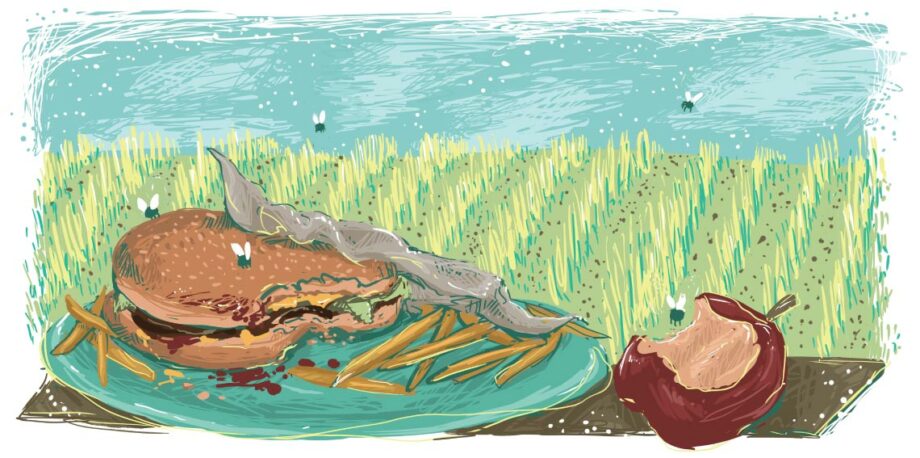Fortunately, there are some innovators attacking the food waste problem. For example, Simon Wong, a business leader in Hong Kong who is heavily involved in the restaurant and banquet business, is hoping to change cultural eating habits there. Waste disposal costs in the city have increased because landfill space is nearly exhausted, which means reducing food waste makes good business sense. So Wong has worked to change the traditional eight-course banquet menus, which are very popular in Hong Kong, to a six-course meal, which is still more than satisfying and greatly reduces the amount of food thrown away. If this were fully adopted across the city, simply changing banquet menus would save 200 metric tons of food waste every day.
We seem fascinated by ever more elaborate means of production, but fail to look at our current use.
We should learn from pioneering efforts like this, seeing the enormous opportunities to reduce food waste — and enhance food security, food safety, environmental sustainability and economic competitiveness worldwide. There is a singular opportunity here, but only if the public and private sectors make the necessary investment. It would make sense for USAID, the Gates Foundation, agribusiness and venture capitalists to match the investment currently made in agricultural biotechnology with parallel investments in reducing food waste. Given the enormous food security, health, environmental and business benefits at stake, it seems odd we haven’t seen more activity here.
Perhaps food suffers from the same problem as energy, water and other resources. We seem fascinated by ever more elaborate means of production, but fail to look at our current use. While it is easy to shout things like “Drill, baby, drill!” and pretend it’s a resource management strategy, we need to actually address our global resource challenges from a balanced perspective. That includes bolstering efforts to improve the supply of resources, but it must also mean better management of our resource demands, especially in reducing waste and improving efficiency.
In a world where resources will become steadily more scarce, competitive and volatile, we need to be smarter about how we meet our needs. Let’s start by picking all of the low-hanging fruit — both that linked to the supply and that linked to demand. Let’s not waste the opportunity to reduce waste. ![]()
Editor’s note: The views expressed here are those of the author and not necessarily of Ensia. We present them to further discussion around important topics. We encourage you to respond with a comment below, following our commenting guidelines, which can be found here. In addition, you might consider submitting a Voices piece of your own. See Ensia’s “Contact” page for submission guidelines.
Ensia shares solutions-focused stories free of charge through our online magazine and partner media. That means audiences around the world have ready access to stories that can — and do — help them shape a better future. If you value our work, please show your support today.
Yes, I'll support Ensia!

- modern farm machinery that minimizes losses during harvest
- resistant crop varieties and insecticides to combat storage pests and reduce spoilage
- improved storage, packaging and cooling technologies
- communication technologies to achieve more timely matching of supply and demand in markets
- frozen and canned food to extend shelf life
- sensor technologies to detect spoilage in perishable foods
I'm not so sure that tackling food waste (in rich countries) is a low-hanging fruit, holding technology constant. Consumers could easily reduce their food waste if they went shopping every day. Retailers could avoid throwing away food if they restocked more frequently and collected enough information about consumer demand. But obviously there are non-trivial costs associated with such strategies. I would argue that focusing on (post-)harvest losses in developing countries would be a better starting point, especially if the goal is to improve food security.
Ulrich Koester has some more useful comments: http://www.sciencedirect.com/science/article/pii/S0306919213000341
But I am not saying that technology is not useful for addressing food waste. In fact, I think it would be excellent to see more R&D and innovation in this space.
Thanks for your useful and constructive comments.
it's encouraging to see discussion of food systems assessed similar to energy systems. clearly they are strongly interrelated and follow a similar analysis as soft vs. hard path, i.e., decentralized, redundant, highly localized models. while food systems cannot be practically analyzed separately from the current globalized economics of food, this focus on food efficiency and end use matching may soon prove a much bigger bite for the buck, to twist the phrase...
Far healthier for people and the planet is to simply not eat the meat in the first place. Huge reductions in meat consumption are required to meet James Hansen's climate change imperative of rolling back 200 years of deforestation.
But talking about that in a serious sustained way risks more than "coming out" as gay. Marion Nestle blew the whistle on this in "Food Politics" but has anything changed? Not as far as I can see.
We still have serious science journals like "Science" publishing unscientific anecdotal apologetic rubbish about meat and nobody blinks. It's 2010 "Food Security" issue was classic for its allowance of absolute drivel getting past peer review and ending up as citable "fact". I can send an analysis if ensia is interested.